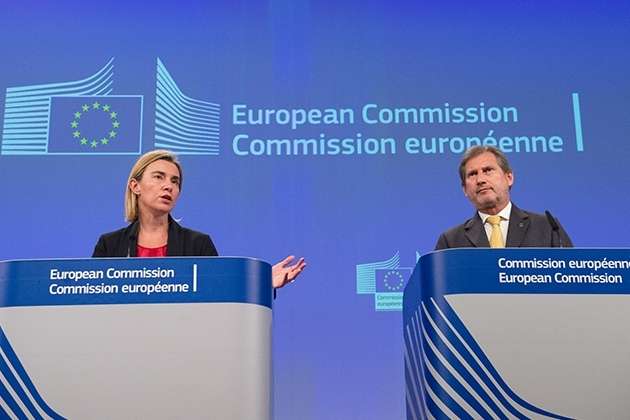The review was followed by the consultation with partner countries, international organisations, social partners, civil society and academia, the EU Delegation to Azerbaijan told APA.
A stronger partnership with our neighbours is key for the European Union, while we face many challenges within our borders and beyond, the EU High Representative for Foreign Affairs and Security Policy Federica Mogherini said.
The terrorist attacks in Paris on Friday, but also recent attacks in Lebanon, Egypt, Turkey and Iraq, show once more that we are confronted with threats that are global and have to be tackled by the international community united, she added.
“We have to build together a safer environment, try to solve the many crises of our common region, support the development and the growth of the poorest areas, and address the root causes of migration. This is precisely the purpose of the current review of the ENP which will promote our common values and interests, and will also engage partners in increased cooperation in security matters. The measures set out today seek to find ways to strengthen together the resilience of our and our partners` societies, and our ability to effectively work together on our common purposes,” said Mogherini.
Commissioner for European Neighbourhood Policy and Enlargement Negotiations, Johannes Hahn in turn said that the most pressing challenge of the EU is the stabilisation of our neighbourhood.
“Conflicts, terrorism and radicalisation threaten us all. But poverty, corruption and poor governance are also sources of insecurity. That is why we will refocus relations with our partners where necessary on our genuinely shared common interests. In particular economic development, with a major focus on youth employment and skills will be key,” Hahn added.
Stabilisation, differentiation and ownership
The ENP will take stabilisation as its main political priority in this mandate. Differentiation and greater mutual ownership will be further key elements of the new ENP, recognising that not all partners aspire to comply with EU rules and standards, and reflecting the wishes of each country concerning the nature and scope of its partnership with the EU. The EU will uphold and continue to promote universal values through the ENP, seeking more effective ways to promote democracy, human rights, fundamental freedoms and rule of law.
Key sectors
The new ENP will mobilise efforts to support inclusive economic and social development; creating job opportunities for youth will be among key measures of economic stabilisation. There will be a new focus on stepping up work with partners countries in the security sector, mainly in the areas of conflict-prevention, counter-terrorism and anti-radicalisation policies. Safe and legal mobility on the one hand and tackling irregular migration, human trafficking and smuggling on the other are further priorities. Finally, greater attention will be paid to working with partners on energy security and climate action.
More flexibility, effectiveness and a new partnership approach
The EU is offering to refocus relations with its neighbours in order to address the political priorities regarded by both sides as the basis of the partnership. This option will be discussed with partners, and is key to increasing their sense of ownership. The aim is also to involve Member states more intensively in the definition and implementation of policy in neighbourhood countries.
The new ENP will introduce some new working methods, including the abolition of the traditional annual package of country reports. Reporting will now be more tailor-made to the nature and working calendar of each relationship.
The new ENP will seek to deploy the available financial resources in a more flexible manner, so that the EU can react more swiftly to new challenges in the neighbourhood. Stronger engagement with civil society, social partners and with youth, is foreseen.
On a regional level, the Eastern Partnership will be further strengthened in line with commitments at the Riga Summit in 2015. The Union for the Mediterranean can play an enhanced role in supporting cooperation between southern neighbours. The new ENP will also seek to involve other regional actors, beyond the neighbourhood, where appropriate, in addressing regional challenges.
Next steps
In the coming months, the proposals unveiled today in the Joint Communication, will be discussed with Member States and partner countries, with a view to jointly determine new priorities and the shape of future relations.
More about:
















































